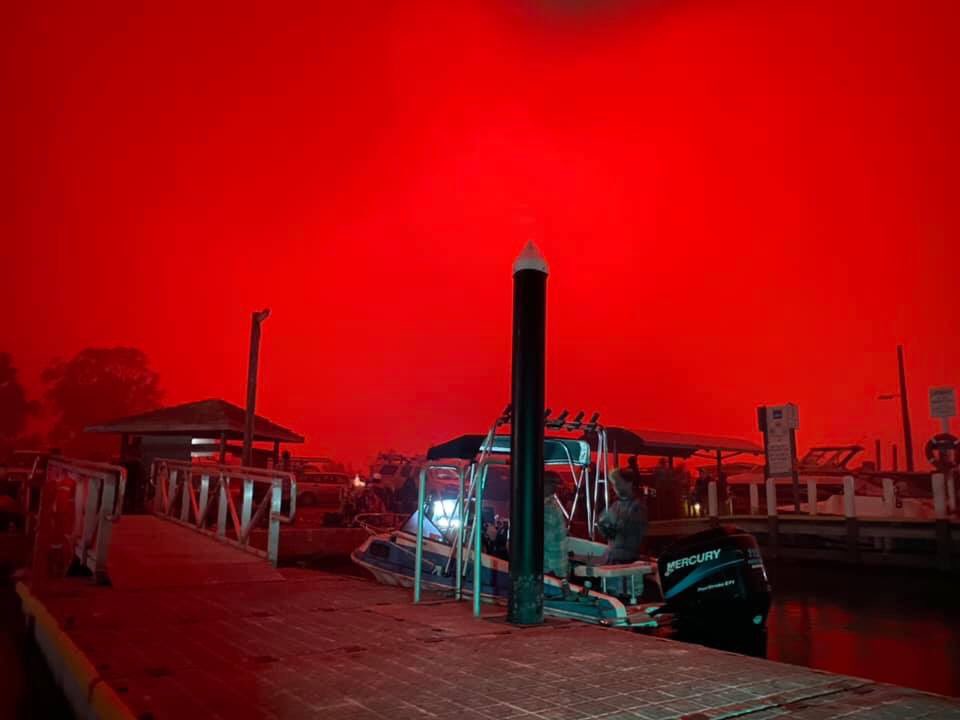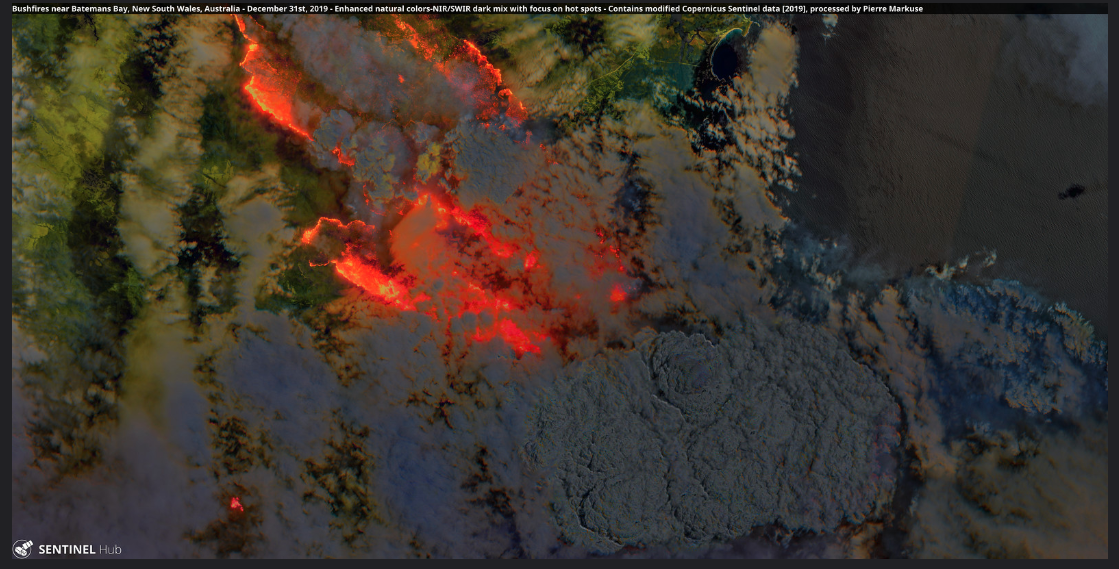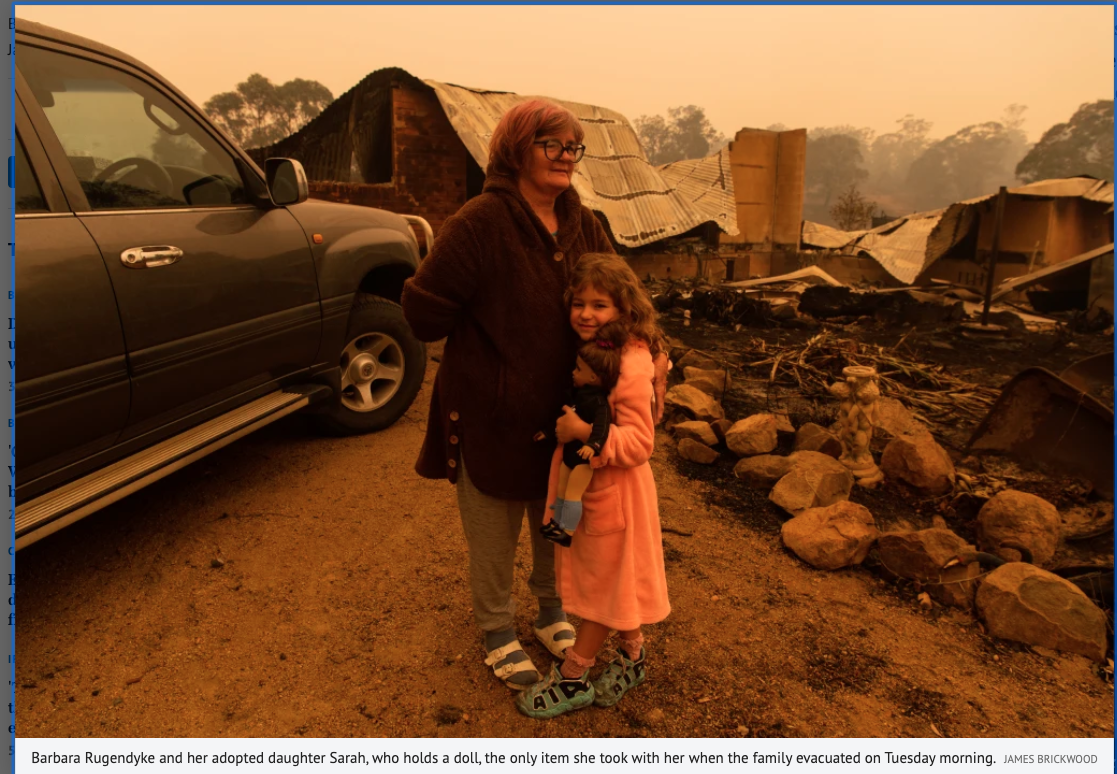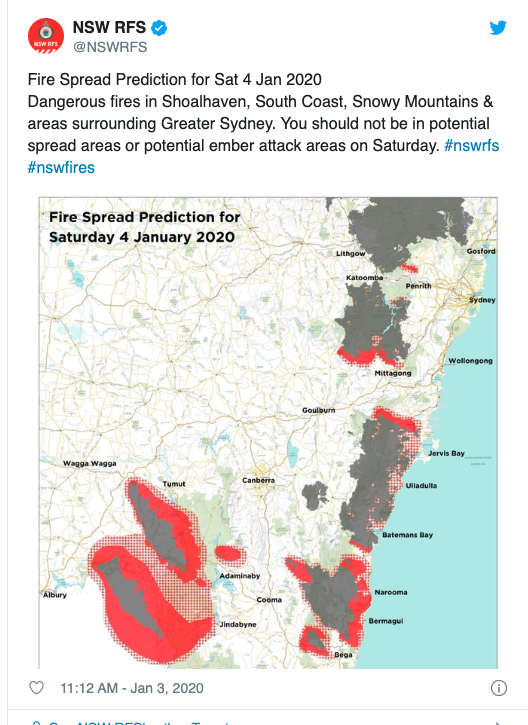For the last four days I have been gripped by emotions I can scarcely describe, struggling to take in the catastrophe as it plays out through the lives of my friends.
Catastrophic bushfires have been plaguing Australia since September, the result of three years of drought, extreme heat and very dry air and wind. You would need to have your head in a bucket not to have noticed. I have been stirred into climate action as a result. My mum mentioned a fire officer had said the whole of the Great Dividing Range could burn before we get any rain. I didn’t want to believe that but now I think it could be an accurate prediction. The stats keep coming out and the totals keep getting scaled up. We have certainly lost to fire land the size of West Virginia and I believe we will end up with cindered land the size of Scotland. Not to mention the lives of people, at least half a billion animals, and the thousands of homes lost. Our do-nothing, pro-coal, business-as-usual Prime Minister refused to meet with chief fire officers who were very keen to warn him of the looming catastrophe back in May. They could see what was coming. He didn’t want to hear it.
On Monday 30th December I was kept busy tracking the fires beginning to take hold in East Gippsland. I was taking a keen interest because I know that area well. I set one of my novels there. I used to travel through the area on my way from the Far South Coast of New South Wales to Melbourne. I was worried. I opened The Guardian live feed. Slowly, I grew alarmed. Chaos unfolded and I could see that Mallacoota was doomed.

Cobargo
As that reality sank in, a notification came through from the Rural Fire Service alerting of a fire that had taken hold up in Badja Road; that it was so intense it had created its own thunderstorm and had crossed the Tuross River and was heading east. I looked on Maps. I saw straight away that my old home town of Cobargo lay directly to the southeast.
It is an idyllic location –



The New Year’s Eve forecast was for strong northwesterly winds that would blow the fire straight for the town. It was a fair distance. Some twenty-five kilometres. So I thought maybe the RFS would take defensive action and things would be okay.
They couldn’t. It wasn’t possible. I woke up on New Year’s Day to find my friends had been alerted in the small hours to leave as the fire charged at them over the mountains and screamed through the valleys. Friends told to go to first one village, then another and then on to a town and then another. Hardly anywhere was safe.
I have owned four properties in the area and lived in another four. I sorted mail at the Cobargo post office. I worked in a gift shop. My children attended the local school. My nieces and nephews were born and grew up on a farm on the edge of the village. I wrote a memoir set in Cobargo, a memoir of building a sustainable lifestyle dream 2005-2009. It was a dream of survival in a post-climate changed reality in what I thought was a climate safe environment. First book I ever wrote. It is currently unpublished.
It is a surreal feeling to be so desperate for news of a place that was once your home, your entire life. All the while knowing how many people you knew or walked past every day are suffering. Are traumatised.

I started checking Facebook profiles to see what my friends were doing. If they were safe. One announced he was staying to defend. I kept going back to his post for updates. Then, the power and comms went out. No more news.
It was an anxious day of waiting, many hours of scrolling through posts and on live media newsfeeds for announcements. Slowly the news filtered through. I saw people I knew appearing on TV. Cobargo had lost a father and son. I knew the father. He was part of the show society committee when I was secretary. His son went to school with my daughters. Then I saw the footage of the main street. The post office survived. A large chunk of the historic village, many buildings over 120 years old, razed. Buildings housing gift shops and cafes. A large portion of what makes Cobargo quaint, what gives it its olde worlde charm, gone.
As that shock sank in, I learnt of friends who had lost their homes. Of others badly burned trying to save theirs. My stay and defend friend did manage to save his: I got the news via his daughter. Other houses in his vicinity are gone. People describe the smoke the heat the chaos the confusion the heroic moments. People describe houses exploding and animals incinerated and birds falling dead out of the sky.

So far, I only know the status of two places I lived. The home I built has survived. The farm next door where my parents lived for seven years has been razed. This photo, showing the current owner, features the bedroom where my mum slept – the wall behind the car.

The people of Cobargo are livid with the federal government and particularly the callous indifference of the Australian Prime Minister. As they should be.

The Looming Threat Continues
And there is no comfort on the immediate horizon. My sister, who still lives in the region, is evacuating like many thousands of others. Even the outer limits of the towns are under threat. Everyone will have to huddle in the centre of towns with the fire approaching.
There are many towns under severe threat tomorrow, Saturday 4th January, in NSW. Humidity will be below 10%. Temps up to 48C. (118.4F) Wind speeds up to 80kmh. The southerly change is not due till Sunday and it will bring its own difficulties. Conditions in Victoria are no better. There are a lot of people in tiny towns trapped. There is no water down there. It is a humanitarian crisis. (watch the fire action here – https://hotspots.dea.ga.gov.au/)

Meanwhile, back in Victoria, the horror continues. People are trapped in tiny villages, completely cut off. In Mallacoota people are being evacuated on navy ships. To the north, mass evacuations are occurring. And the fires in the Snowy Mountains and slopes, the two fat blobs on the bottom left corner of the map above, they are joining up and when the cool change does sweep through on Sunday, they are heading straight for Canberra.
We need to face the horror of this and stamp it into our brains. These monster fires are capable of burning through the night traversing 24km in about 6 hours as though by stealth. These fires create firestorms that roar at you like a steam train, they hurl “embers” (read little fire bombs) many kilometres, they suck the oxygen out of the air, they create their own weather including lightning and tornadoes; these fires have been caused by climate change.
My heart goes out to everyone caught up in this devastation.
Call to Action:
-
This is my own fundraiser set up with my daughter in support of the Cobargo Co-operative Society https://www.gofundme.com/f/fences-for-farmers-around-cobargo
-
Donate
-
Join in Climate Action

 Isobel Blackthorn is an award-winning author of unique and engaging fiction. She writes gripping mysteries, dark psychological thrillers and historical fiction. She is the author of The Unlikely Occultist: a biographical novel of Alice A. Bailey. She has become a climate activist.
Isobel Blackthorn is an award-winning author of unique and engaging fiction. She writes gripping mysteries, dark psychological thrillers and historical fiction. She is the author of The Unlikely Occultist: a biographical novel of Alice A. Bailey. She has become a climate activist.







